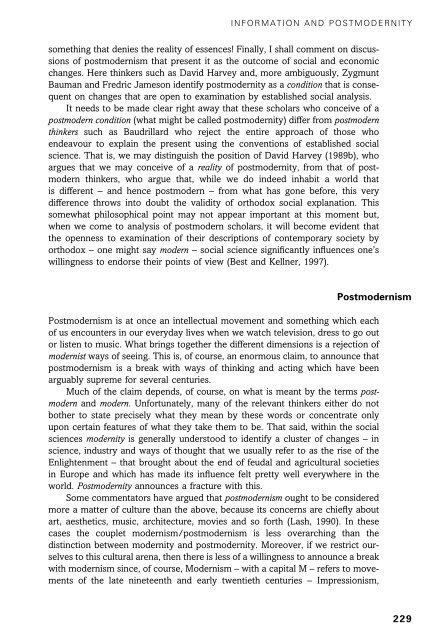Theories of the Information Society, Third Edition - Cryptome
Theories of the Information Society, Third Edition - Cryptome
Theories of the Information Society, Third Edition - Cryptome
You also want an ePaper? Increase the reach of your titles
YUMPU automatically turns print PDFs into web optimized ePapers that Google loves.
INFORMATION AND POSTMODERNITY<br />
1<br />
1<br />
1<br />
2<br />
1<br />
1<br />
something that denies <strong>the</strong> reality <strong>of</strong> essences! Finally, I shall comment on discussions<br />
<strong>of</strong> postmodernism that present it as <strong>the</strong> outcome <strong>of</strong> social and economic<br />
changes. Here thinkers such as David Harvey and, more ambiguously, Zygmunt<br />
Bauman and Fredric Jameson identify postmodernity as a condition that is consequent<br />
on changes that are open to examination by established social analysis.<br />
It needs to be made clear right away that <strong>the</strong>se scholars who conceive <strong>of</strong> a<br />
postmodern condition (what might be called postmodernity) differ from postmodern<br />
thinkers such as Baudrillard who reject <strong>the</strong> entire approach <strong>of</strong> those who<br />
endeavour to explain <strong>the</strong> present using <strong>the</strong> conventions <strong>of</strong> established social<br />
science. That is, we may distinguish <strong>the</strong> position <strong>of</strong> David Harvey (1989b), who<br />
argues that we may conceive <strong>of</strong> a reality <strong>of</strong> postmodernity, from that <strong>of</strong> postmodern<br />
thinkers, who argue that, while we do indeed inhabit a world that<br />
is different – and hence postmodern – from what has gone before, this very<br />
difference throws into doubt <strong>the</strong> validity <strong>of</strong> orthodox social explanation. This<br />
somewhat philosophical point may not appear important at this moment but,<br />
when we come to analysis <strong>of</strong> postmodern scholars, it will become evident that<br />
<strong>the</strong> openness to examination <strong>of</strong> <strong>the</strong>ir descriptions <strong>of</strong> contemporary society by<br />
orthodox – one might say modern – social science significantly influences one’s<br />
willingness to endorse <strong>the</strong>ir points <strong>of</strong> view (Best and Kellner, 1997).<br />
Postmodernism<br />
Postmodernism is at once an intellectual movement and something which each<br />
<strong>of</strong> us encounters in our everyday lives when we watch television, dress to go out<br />
or listen to music. What brings toge<strong>the</strong>r <strong>the</strong> different dimensions is a rejection <strong>of</strong><br />
modernist ways <strong>of</strong> seeing. This is, <strong>of</strong> course, an enormous claim, to announce that<br />
postmodernism is a break with ways <strong>of</strong> thinking and acting which have been<br />
arguably supreme for several centuries.<br />
Much <strong>of</strong> <strong>the</strong> claim depends, <strong>of</strong> course, on what is meant by <strong>the</strong> terms postmodern<br />
and modern. Unfortunately, many <strong>of</strong> <strong>the</strong> relevant thinkers ei<strong>the</strong>r do not<br />
bo<strong>the</strong>r to state precisely what <strong>the</strong>y mean by <strong>the</strong>se words or concentrate only<br />
upon certain features <strong>of</strong> what <strong>the</strong>y take <strong>the</strong>m to be. That said, within <strong>the</strong> social<br />
sciences modernity is generally understood to identify a cluster <strong>of</strong> changes – in<br />
science, industry and ways <strong>of</strong> thought that we usually refer to as <strong>the</strong> rise <strong>of</strong> <strong>the</strong><br />
Enlightenment – that brought about <strong>the</strong> end <strong>of</strong> feudal and agricultural societies<br />
in Europe and which has made its influence felt pretty well everywhere in <strong>the</strong><br />
world. Postmodernity announces a fracture with this.<br />
Some commentators have argued that postmodernism ought to be considered<br />
more a matter <strong>of</strong> culture than <strong>the</strong> above, because its concerns are chiefly about<br />
art, aes<strong>the</strong>tics, music, architecture, movies and so forth (Lash, 1990). In <strong>the</strong>se<br />
cases <strong>the</strong> couplet modernism/postmodernism is less overarching than <strong>the</strong><br />
distinction between modernity and postmodernity. Moreover, if we restrict ourselves<br />
to this cultural arena, <strong>the</strong>n <strong>the</strong>re is less <strong>of</strong> a willingness to announce a break<br />
with modernism since, <strong>of</strong> course, Modernism – with a capital M – refers to movements<br />
<strong>of</strong> <strong>the</strong> late nineteenth and early twentieth centuries – Impressionism,<br />
229
















